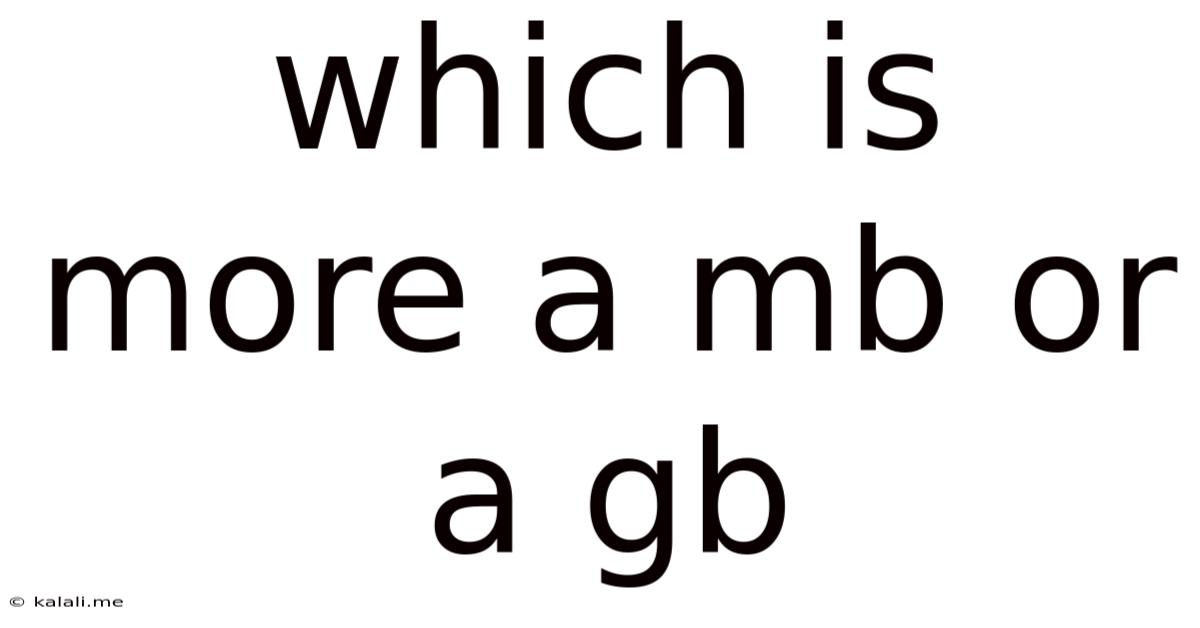Which Is More A Mb Or A Gb
Kalali
Jun 11, 2025 · 3 min read

Table of Contents
MB vs GB: Understanding the Difference in File Sizes
Are you confused about the difference between MB and GB when dealing with file sizes and storage capacity? This article will clearly explain the relationship between megabytes (MB) and gigabytes (GB), helping you understand how much data each represents and why the distinction is crucial in the digital world. This knowledge will empower you to make informed decisions about your digital storage needs and file management.
A gigabyte (GB) is significantly larger than a megabyte (MB). In fact, one gigabyte is equal to 1024 megabytes. Think of it like this: a megabyte is a relatively small unit, suitable for measuring smaller files like individual photos or short documents. A gigabyte, on the other hand, is a much larger unit, commonly used to measure the storage capacity of hard drives, SSDs, and other storage devices, as well as the size of larger files such as movies, music albums, or large software applications.
Understanding the Scale: Bytes, Kilobytes, Megabytes, and Gigabytes
To fully grasp the difference, it's helpful to understand the hierarchy of digital data units:
- Bit (b): The smallest unit of data, representing a binary digit (0 or 1).
- Byte (B): Eight bits make up one byte, the fundamental unit for measuring digital information.
- Kilobyte (KB): 1024 bytes equal one kilobyte.
- Megabyte (MB): 1024 kilobytes equal one megabyte.
- Gigabyte (GB): 1024 megabytes equal one gigabyte.
- Terabyte (TB): 1024 gigabytes equal one terabyte. And the scale continues beyond that with petabytes, exabytes, and more!
Practical Examples to Illustrate the Difference
Let's consider some real-world scenarios:
- A high-resolution photograph: Might be around 5-10 MB in size.
- A short music track: Could be around 5-10 MB.
- A feature-length movie in high definition: Could easily reach several gigabytes (GB), possibly up to 10 GB or more.
- A typical hard drive or SSD: Ranges from a few hundred gigabytes (GB) to several terabytes (TB).
Why Understanding MB and GB is Important
Knowing the difference between MB and GB is crucial for several reasons:
- Choosing the right storage: Understanding file sizes helps determine how much storage space you need for your computer, phone, or cloud storage account. Failing to account for file sizes can lead to running out of storage space unexpectedly.
- Downloading files: It allows you to estimate download times. Larger files (measured in GB) will naturally take longer to download than smaller files (measured in MB).
- Managing data: Efficient file management requires an understanding of file sizes. This enables better organization and prevents your digital spaces from becoming cluttered with unnecessary files.
- Understanding internet speeds: Internet speeds are often expressed in Mbps (megabits per second), which is closely related to MBps (megabytes per second). This helps in estimating download/upload times.
In conclusion, while both MB and GB represent units of digital data, the difference in scale is substantial. Understanding this difference is crucial for navigating the digital world efficiently and making informed decisions about your data storage and management needs. Remember, a gigabyte (GB) is 1024 times larger than a megabyte (MB), a difference you'll consistently encounter in everyday computing.
Latest Posts
Latest Posts
-
How Many Bottles Is 64 Oz Of Water
Jul 02, 2025
-
How Many Ounces In Pound Of Meat
Jul 02, 2025
-
What Is The Diameter Of A Quarter
Jul 02, 2025
-
Spoon Gets Hot In A Bowl Of Soup
Jul 02, 2025
-
How Many Cups In A 16 Oz Sour Cream
Jul 02, 2025
Related Post
Thank you for visiting our website which covers about Which Is More A Mb Or A Gb . We hope the information provided has been useful to you. Feel free to contact us if you have any questions or need further assistance. See you next time and don't miss to bookmark.